
|
The world of non-commercial film and A-V |
Events Diary | Search | ||
| The Film and Video Institute | | ||||
The making of On the Edge of Another World and Menschen in Wandel (Folk in Transition)
To BIAFF 2009 results | To Full Making Of Index
On the Edge of Another World by Suzy Sommer and Menschen im Wandel (Folks in Transition) by Guido Haesen both won 4-Star awards at BIAFF 2009. Both films were made on the same trip. Guido explains:
The newspapers are full of stories about the Venezuelan President Hugo Chavez, his "Bolivarian revolution" and his march toward 21st-century socialism. Could it be that a whole population is profiting from the rich oil exports, as Chavez claims? Suzy and I decided to visit this South-American country, in November 2007.
Visiting Venezuela
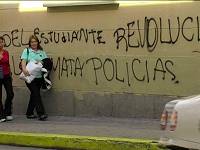 |
We arrive in Caracas, a city surrounded by slums. For security
reasons we do not venture into the slums. The city centre is crowded with
military and policemen. Slogans are everywhere. Chavez has organised a Referendum
for the December 3rd 2007. The main objective of the referendum: Chavez president
for life.
Caracas is not really a place that needs a visit so we decide to leave for Maracaibo. The traffic jam is impressive. Everyone has an old car, imported from the States. The fuel is cheaper than water, so the roads are overloaded. People are nervous, aggressive, direct contact is impossible. We had planned to stay 3 days in the coastal area but after 1 day we leave the coast and discover a completely different Venezuela. |
|
A completely different Venezuela
The sweet smell of crushed sugarcane brings us to an old fashion mill. Three men are working in a damp atmosphere. They don't mind my tripod, so long as I am not in their way. The shots have to be taken in manual-mode, because my Canon XM2 would "pump" in automatic-mode due to the steam that fills the little factory. The humidity does not bother us, but the continuous presence of hundreds of wasps around our faces is the real challenge.
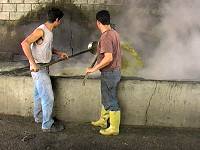 |
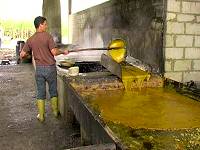 |
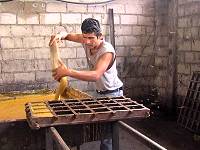 |
We get a chance to talk to one of the men. With my limited knowledge of Spanish I ask him what the socialism of Chavez means to him. Suzy gets it all on tape. She works with a small but very useful Panasonic NV-GS500. Because that camera is small, people are not "stressed" and act very natural during an "interview".
We learn that the 3 men work 10 hours a day, 6 days a week for a monthly pay of 120 euros. This seems to be a good salary for Venezuela. But the men have no social security. An accident or illness can quickly lead to a disaster for the whole family. In 2007, 35% of the population lives below poverty level.
Llanos - an incongruous world
We travel to the centre of Venezuela, in seasonally flooded grassland that covers nearly one-third of the country. This area, called "Llanos" was famous for the quality of its cattle. But with the discovery of oil in 1917, Venezuela was catapulted into a different world. Oil was the only important issue. Other long-term projections were never made. Farmers moved away from the Llanos. In 2007, Venezuela had to import beef.
We can stay a couple days at the Ranch "El Frio" and soon notice that these folks live in an incongruous world. The farm manages up to 50,000 cattle. The bulk of the work is performed by the "Llaneros". "Llaneros"is the term for those men, who are called Cowboys or Gauchos elsewhere.
We get up at 5 o'clock; the temperature is already 27°C with 100% humidity. Not very good for the cameras, but we are lucky. Both cameras function perfectly. And then, as in a John Wayne film, groups of Llaneros enter the farm. Some bring in the herds from the meadows; others will start building a barn.
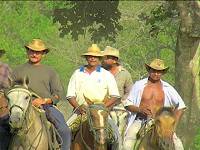 These moments are so unexpected that it looks like a Hollywood
scene.
These moments are so unexpected that it looks like a Hollywood
scene.
Contact with these men is not possible. They don't like to talk to strangers and they don't like Chavez politics. A camera is tolerated, but nothing more.
We can borrow a jeep for a day. The soil is wet and acid. Meadows are scarce so the herds do not move a lot. As a result, nature in the Llanos is transformed into an authentic Noah's Ark. The wet climate attracts millions of birds. So far ornithologists have identified 340 species.
We leave the centre of Venezuela and fly in a tiny airplane from Ciudad Bolivar to Canaima, situated near the border with Brazil and Guyana. Since this area has become famous through Arthur Doyle's novel "The Lost World", tourism has partially replaced the traditional hunting and fishing activities of the Pémon tribe. We discover a population that lives in harmony with nature and attach great spiritual significance to the surrounding mountains, lakes and rivers.
Chavez's social programmes seem to have brought some benefits to these Indians. However, the conjunction of vibrant forests, extraordinary scenery and peaceful existence is gradually being destabilised by the government policy aimed at promoting mining throughout the region.
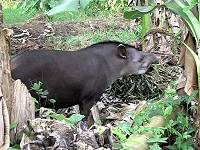 |
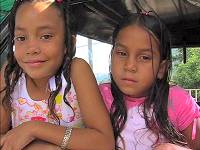 |
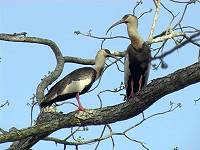 |
Our final destination is the Orinoco River, on the East coast of Venezuela. This labyrinth of hundreds of waterways is the homeland for 20,000 Indians of the Warao tribe. Each family owns a wooden construction without walls. The roof is often made of palm leaves. Waraos follow a matriarchal system, where the husband moves to his wife's family. Children, parents and grandparents share the basic commodities.
Under pressure from the government and major oil companies, communities are created artificially. The settlements dispose of some kind of housing system, electricity and a basic infrastructure. Unfortunately, this environment deteriorates very rapidly, waste is accumulating in every corner, hygienic conditions degrade and diseases appear, killing 50% of the children before the age of two. This artificial consumer society does not fit with the old traditions. The natives of the Orinoco are in danger, not only because their values and traditions are exposed to corrupt administrators and politicians, but also because their ancestral homeland is threatened by the massive oil exploitation of their land.
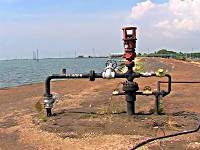
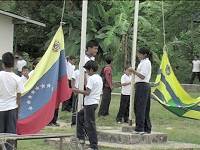 Throughout our trip through Venezuela we did not have the feeling
that the population is getting the profit from the huge oil exploitation.
Since his election as President in 1999, Chavez has invested many oil-dollars
in social programmes. But time has worn down his idealistic approach and
the population seems to have lost confidence in the charismatic leader. We
got the impression that most people have very limited access to the development
of their country. On December 3, 2007: for the first time, Chavez has lost
his Referendum.
Throughout our trip through Venezuela we did not have the feeling
that the population is getting the profit from the huge oil exploitation.
Since his election as President in 1999, Chavez has invested many oil-dollars
in social programmes. But time has worn down his idealistic approach and
the population seems to have lost confidence in the charismatic leader. We
got the impression that most people have very limited access to the development
of their country. On December 3, 2007: for the first time, Chavez has lost
his Referendum.
We fly back to Europe with 11 hours of video and unforgettable memories of a country in transition. Once at home we share our recorded scenes. Suzy, who uses Adobe Premiere, has constructed her 10 minute video On the Edge of Another World around the vanishing world of the Indians. I have tried to catch the feeling of a few people who live in Venezuela. My film is cut on Edius and is spoken in German, mainly because of the interesting interview with a German ethnologist. He spoke about Venezuelans as "Menschen im Wandel" (Folks in Transition) and I thought that this was exactly the impression that we had after our trip through Venezuela.
- Guido Haesen & Suzy Sommer
Share your passions.
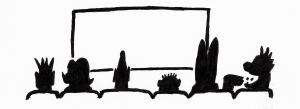
Share your stories.